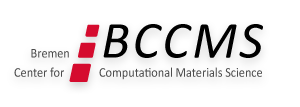Program of the International CECAM Workshop
Thinking outside the box - beyond machine learning for quantum chemistry
Conference site: House of Science, Downtown
Monday, October 7th 2019 (Radisson Blu Hotel Bremen) | ||||
18:00 | – | 21:00 |
| Registration |
Tuesday, October 8th 2019 (House of Science Bremen, Downtown) | ||||
08:00 | – | 08:50 |
| Registration |
08:50 | – | 09:00 |
| Opening and welcome, Thomas Frauenheim |
Session: |
| Machine learning for Complex Quantum Systems | ||
|
| Chair: Sheng Meng | ||
09:00 | – | 09:40 |
| Anatole von Lilienfeld, University of Basel, Switzerland |
09:40 | – | 10:20 |
| Tristan Bereau, Max Planck Institute for Polymer Research, |
10:20 | – | 10:50 |
| Coffee Break |
10:50 | – | 11:30 |
| Karsten Reuter, Munich University of Technology, Germany |
11:30 | – | 12:10 |
| Hiromi Nakai, Waseda University, Shinjuku, Japan |
| 12:10 | – | 12:15 | Group Photo | |
12:15 | – | 13:50 |
| Lunch Break (Restaurant Q1) and Coffee |
13:50 | – | 14:30 |
| Guanhua Chen, University of Hong Kong, China |
Session: |
| Machine Learning for Structure Prediction | ||
|
|
|
| Chair: Thomas A. Niehaus |
14:30 | – | 15:10 |
| Bjørk Hammer, Aarhus University, Denmark |
15:10 | – | 15:50 |
| Rickard Armiento, Lynköping University, Sweden |
15:50 | – | 16:20 |
| Coffee Break |
16:20 | – | 17:00 |
| Stefano Leoni, University of Cardiff, UK |
17:00 | – | 17:40 |
| Jacek Jakowski, Oak Ridge National Laboratory, Tennessee, USA |
19:00 | – | 21:30 |
| Welcome Reception (Bremen Town Hall) | |
Wednesday, October 9th 2019 (House of Science Bremen, Downtown) | |||||
Session: |
| Machine Learning for DFTB repulsive interactions (I) | |||
|
|
|
| Chair: Malte Schüler | |
08:30 | – | 09:10 |
| Maxime Van den Bossche, Sorbonne University, Paris, France | |
09:10 | – | 09:50 |
| David J. Yaron, Carnegie Mellon University, Pittsburgh, | |
09:50 | – | 10:30 |
| Nir Goldman, Lawrence Livermore National Laboratory, | |
10:30 | – | 11:00 |
| Coffee Break | |
11:00 | – | 11:40 |
| Benjamin Hourahine, University of Strathclyde, Glasgow, UK | |
11:40 | - | 12:20 |
| Stefan Grimme, University of Bonn, Germany | |
12:20 | – | 14:00 |
| Lunch Break (Restaurant Q1) and Coffee | |
Session: |
| Machine Learning and MD | |||
|
|
|
| Chair: Adam McSloy | |
14:00 | – | 14:40 |
| Kipton Barros, Los Alamos National Laboratory, New Mexico, USA Advances in machine learned potentials for molecular dynamics simulation | |
14:40 | – | 15:20 |
| Weitao Yang, Duke University Durham, North Carolina, USA | |
15:20 | – | 16:00 |
| Stephan Irle, Oak Ridge National Laboratory, Tennessee, USA | |
16:00 | – | 16:30 |
| Coffee Break | |
16:30 | – | 17:10 |
| Roland Mitric, University of Wuerzburg, Germany | |
17:10 | – | 17:50 |
| Franco P. Bonafé, Max Planck Institute for the Structure and Dynamics | |
19:00 | – | 22:30 |
| Conference Dinner (Restaurant Juergenshof) | |
Thursday, October 10th 2019 (House of Science Bremen, Downtown) |
| ||||
Session: |
| Machine Learning for Quantum Chemistry & Electronic Structure |
| ||
|
|
|
| Chair: Alessandro Pecchia |
|
08:30 | – | 09:10 |
| Benjamin T. Nebgen, Los Alamos National Laboratory, New Mexico, USA |
|
| 09:10 | – | 10:50 | Volker W. Blum, Duke University, Durham, North Carolina, USA The ELSI infrastructure | ||
09:50 | – | 10:30 |
| Ursula Röthlisberger, Swiss Federal Institute of Technology, |
|
10:30 | – | 11:00 |
| Coffee Break |
|
11:00 | – | 11:40 |
| Julian Gebhardt, Fraunhofer Institute for Mechanics of Materials, Freiburg, Germany |
|
11:40 | – | 12:20 |
| Alexandre Tkatchenko, University of Luxembourg, Luxembourg |
|
12:20 | – | 14:00 |
| Lunch Break (Restaurant Q1) and Coffee |
|
Session: |
| Machine Learning for DFTB repulsive interactions (II) |
| ||
|
|
|
| Chair: Cristopher Camacho |
|
14:00 | – | 14:40 |
| Chiyung Yam, Beijing Computational Science Research Center, China |
|
14:40 | - | 15:20 |
| Qiang Cui, Boston University, Massachusetts, USA |
|
15:20 | - | 16:00 |
| Jolla Kullgren, University of Uppsala, Sweden |
|
17:20 |
|
|
| Poster Mounting |
|
17:30 | – | 21:00 |
| Poster Session, Catering Buffet (House of Science) |
|
Friday, October 11th 2019 (House of Science Bremen, Downtown) |
| ||||
Session: | ML for electronic and spectroscopic properties |
| |||
|
|
|
| Chair: Balint Aradi |
|
08:30 | – | 09:10 |
| Patrick Rinke, Aalto University, Helsinki, Finland |
|
09:10 | – | 09:50 |
| Olexandr Isayev, University of North Carolina, Chapel Hill, USA |
|
09:50 | – | 10:30 |
| Anders M. N. Niklasson, Los Alamos National Laboratory, New Mexico, USA |
|
10:30 | – | 11:00 |
| Coffee Break |
|
11:00 | – | 11:40 |
| Sergei Tretiak, Los Alamos National Laboratory, New Mexico, USA |
|
11:40 | – | 12:20 |
| Gotthard Seifert, Technical University of Dresden, Germany |
|
12:20 | – | 12:25 |
| Closing words: Thomas Frauenheim |
|
12:25 |
|
|
| Departure |
|
